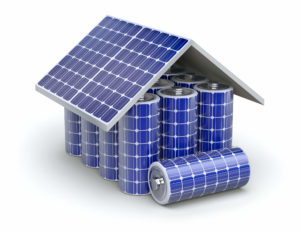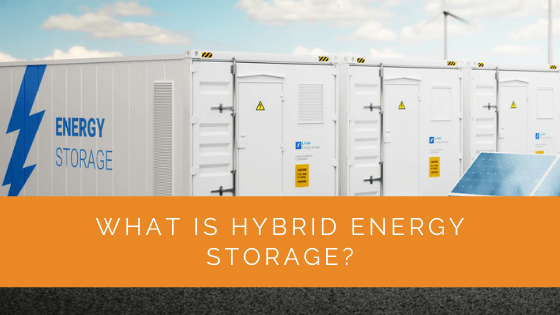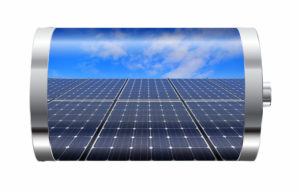As the awareness of the adverse effects of global warming and climate change increases, so does the pressing need to switch to renewable energy sources. So, what does a hybrid energy storage system mean in this regard?
To put it simply, hybrid energy storage systems or HESS bring together different types of energy systems. For example, the system could be a combination of wind and solar energy (photovoltaics). The idea is very promising, and there’s a lot of research being done in the area.
Are you looking to learn more about a hybrid energy storage system? We have got you covered. In this post, we will walk you through HESS with utmost thoroughness: what the system is, how it works, its benefits, and so on.
All that remains is for you to dive right into our post!
Contents
- 1 Key Takeaways
- 2 Hybrid Energy Storage System: Explained
- 3 How Does HESS Work?
- 4 Types of Hybrid Energy Storage Systems
- 5 What are the Applications of HESS?
- 6 What are the Benefits of HESS?
- 7 What are the Downsides to Hybrid Energy Storage?
- 8 Case Study: Implementing Hybrid Energy Storage Systems in Urban Renewable Energy Projects
- 9 Expert Insights From Our Solar Panel Installers About Hybrid Energy Storage Systems (HESS)
- 10 Experience Solar Excellence with Us!
- 11 Wrapping Up
Key Takeaways
- Hybrid Energy Storage Systems (HESS) combine various energy sources, offering promising benefits and applications in the transition to renewable energy.
- HESS can be applied to electric vehicles, optimizing energy management by combining supercapacitors and batteries for improved efficiency and reduced costs.
- There are three main types of HESS: Power-to-Heat/Battery, Battery/Battery, and Ultracapacitor/Battery, each catering to specific energy storage needs and requirements.
Hybrid Energy Storage System: Explained
When it comes to HESS, the following terms become important: generation, storage, consumption, and technology. This is because HESS is all about bringing these different energy systems together in one, single system. By doing so, HESS brings a host of amazing benefits to the table.
During the early stages of development, hybrid energy storage systems were all about combining non-renewable sources. For example, one of the hybrid systems achieved the integration of diesel generators with battery storage systems.
However, as technology evolved, researchers were able to twist HESS by combining entirely renewable energy sources. By far, the combination of solar and wind energies for power generation is the most common example of this category.
In the past, hybrid energy storage systems have also combined two or more energy storage systems (in particular) by unifying battery storage systems, supercapacitors, and fuel cells.
Being an energy storage technology, through HESS, it became possible to meet vastly different energy requirements through a single hybrid system. This means that HESS can provide power in short bursts while also doubling up as a constant power source, capable of providing consistent and high-quality supply over longer durations.

How Does HESS Work?
Now that you know why HESS is a bright prospect for the future of energy storage technologies take a look at how it works. For this purpose, let’s consider a hybrid energy storage system that’s used in electric vehicles. This is how it works:
- As far as electric vehicles are concerned, lithium-ion batteries are the preferred energy source.
- However, the thermal properties of these batteries make them unsuitable for use in vehicles like sports cars.
- To rectify this, industry experts found that reducing the stress applied to the lithium-ion batteries was necessary.
- As a solution for the same, research showed that using a HESS with a supercapacitor as the power source and a battery as the energy source worked well.
- By combining the characteristics of the two storage systems, HESS established an effective energy management application for electric vehicles.
- This was a power move, with wide-ranging benefits, including a reduction in the size of the power source, improved efficiency, and reduced cost of power generation.
Types of Hybrid Energy Storage Systems
As one of the emerging energy storage technologies, HESS still has a long way to go. Currently, three types of HESS are being used in a wide range of applications, from electronics to other utilities. See for yourself:
Power-to-Heat/Battery
This type of hybrid energy storage system can store energy in the form of heat. Consequently, this leads to a significant reduction in the cost of storing energy. Additionally, this HESS can reduce the battery size by a considerable margin.
A 20 MW power-to-heat/battery storage facility in Bremen, Germany, that completely follows the HESS model. The operators at the facility found that the battery capacity needed fell by 50% after installation.
Battery/Battery
For a very long time, two battery types have ruled the roost: flow batteries and lithium-ion batteries. While flow batteries are known for their cost-effectiveness and longevity, lithium-ion batteries are big on energy density.
The Battery/Battery HESS aims to provide the best of both worlds in a single energy storage system. A UK-based battery manufacturer, RedT, has conceptualized a HESS where the flow batteries cater to the energy needs, with the lithium-ion battery taking care of the performance aspect.
Ultracapacitor/Battery
When batteries and ultracapacitors meet, you get something truly special. In this HESS type, the ultracapacitor provides the benefit of quick bursts of energy, with the battery providing sustained power over longer durations. With the ability to meet dual power requirements, this HESS is poised to be the future of energy storage technologies.
What are the Applications of HESS?
By now, you must have understood that the potential of HESS makes it a great choice for many applications. If the articles published in this area are anything to go by, the following are some high-performance HESS-applications you can be on the lookout for:
- The use of HESS in hybrid or electric automobiles (as was seen earlier in the post).
- HESS can be utilized in renewable energy supply systems, especially those that use a combination of a battery and hydrogen.
- On an island known as Pellworm, they used grid-connected HESS to optimize the power supply to households across districts and regions.
- HESS can also be leveraged to improve the energy management practices across wind-energy parks.
- SMEs/battery-HESS and flywheel/battery-HESS are also high potential applications.
What are the Benefits of HESS?
Out of the many energy storage systems, HESS stands out because of the many benefits the system offers:
- HESS can significantly lower the cost of operation through the integration of many energy storage systems.
- It can greatly improve overall system efficiency.
- It can increase the longevity of your energy management solutions by a significant margin.
- HESS guarantees high-quality performance at all times.
- The system can reduce the size and load of your energy/power sources, thereby paving the way for easy storage.
- HESS can revolutionize renewable energy sources, making them a cleaner and greener option in the future.
- HESS is still in its nascent stage. With new developments happening each day, the performance and potential of the system are only going to peak exponentially.

What are the Downsides to Hybrid Energy Storage?
While HESS has a lot of scope in the future, a few downsides to the technology call for a comprehensive review. Here are a few downsides to HESS:
- Overall, the system is very complex to implement.
- It can be difficult to procure the software and hardware configurations required to operate a hybrid energy storage system.
- If you want to commercially implement hybrid energy storage systems, there are many regulatory barriers you need to cross.
- Hybrid energy storage systems can constrain mobility.
Nevertheless, smart developments in technology and improvements in design can likely address most of these downsides.
Case Study: Implementing Hybrid Energy Storage Systems in Urban Renewable Energy Projects
Background
At Solar Panels Network USA, our commitment to advancing renewable energy solutions led us to explore the potential of Hybrid Energy Storage Systems (HESS). Recognizing the need for efficient and reliable energy storage in urban environments, we embarked on a project to implement HESS in a mixed-use development.
Project Overview
The objective was to enhance the energy storage capabilities of a renewable energy system within a mixed-use urban complex. This project aimed to demonstrate the benefits of combining different energy storage technologies to optimize energy management and improve overall system performance.
Implementation
- Site and Energy Needs Assessment:
- Conducted a comprehensive energy audit to understand the energy consumption patterns of the residential and commercial units within the complex.
- Identified the need for a reliable and efficient energy storage solution to manage peak demand and ensure a consistent power supply.
- Designing the Hybrid Energy Storage System:
- Developed a HESS that combined lithium-ion batteries for high energy density and supercapacitors for rapid energy discharge and recharge capabilities.
- Integrated solar and wind energy sources to provide a sustainable and renewable energy supply to the complex.
- Installation and Integration:
- Installed the HESS components, ensuring seamless integration with the existing renewable energy infrastructure.
- Implemented an advanced energy management system to monitor and control the storage and distribution of energy.
Results
The implementation of the Hybrid Energy Storage System resulted in several notable outcomes:
- Enhanced Energy Efficiency: The combination of batteries and supercapacitors optimized energy storage and management, leading to a significant improvement in overall energy efficiency.
- Increased Reliability: The HESS provided a consistent and high-quality power supply, effectively managing peak demand and reducing reliance on the grid.
- Cost Savings: The improved efficiency and reliability of the energy system led to substantial cost savings for the residents and businesses within the complex.
- Sustainability: By leveraging renewable energy sources and efficient storage technologies, the project contributed to the complex’s sustainability goals and reduced its carbon footprint.
Summary
Our project successfully demonstrated the benefits of Hybrid Energy Storage Systems in an urban renewable energy context. By combining different energy storage technologies, we achieved significant improvements in energy efficiency, reliability, and cost-effectiveness. At Solar Panels Network USA, we continue to innovate and provide cutting-edge renewable energy solutions that meet the diverse needs of our clients.
Expert Insights From Our Solar Panel Installers About Hybrid Energy Storage Systems (HESS)
Hybrid Energy Storage Systems are revolutionizing the renewable energy landscape by combining different storage technologies. This combination enhances efficiency and reliability, making it possible to store and utilize energy more effectively.
Senior Energy Consultant
The integration of batteries with supercapacitors in HESS optimizes energy management, especially in electric vehicles. This not only reduces the size and cost of the power source but also significantly improves the vehicle’s overall performance.
Lead Solar Engineer
HESS represents a significant step forward in sustainable energy solutions. By combining various energy storage systems, we can achieve a more consistent and high-quality power supply, which is crucial for both residential and commercial applications.
Chief Installation Engineer
Experience Solar Excellence with Us!
Trust in Solar Panels Network USA, where our seasoned experts deliver top-quality solar solutions for homes and businesses nationwide. With a legacy of countless successful installations and a commitment to sustainable energy, we’re your reliable partner in the solar journey. Ready for a brighter, eco-friendly future? Call us now at (855) 427-0058 and harness the power of the sun!
Wrapping Up
Our article was all about what is hybrid energy storage. In the introduction, we gave you a brief overview of HESS and a glimpse of what you can expect from our post. We followed that up with an in-depth explanation of hybrid energy storage systems, their working mechanisms, and their types.
Additionally, we illustrated each of the different energy storage system types with examples. We also provided you with a comprehensive analysis and compared the benefits and downsides of HESS. Further, we combed through the recent trends in energy storage technologies and rounded up the most promising applications of hybrid energy storage.
We hope that this post has helped get you acquainted with hybrid energy storage technology and what it means for renewable energy.
About the Author
Solar Panels Network USA stands at the forefront of solar energy solutions, driven by a team of seasoned solar engineers and energy consultants. With over decades of experience in delivering high-quality solar installations and maintenance, we are committed to promoting sustainable energy through customer-centric, tailored solutions. Our articles reflect this commitment, crafted collaboratively by experts to provide accurate, up-to-date insights into solar technology, ensuring our readers are well-informed and empowered in their solar energy decisions.


